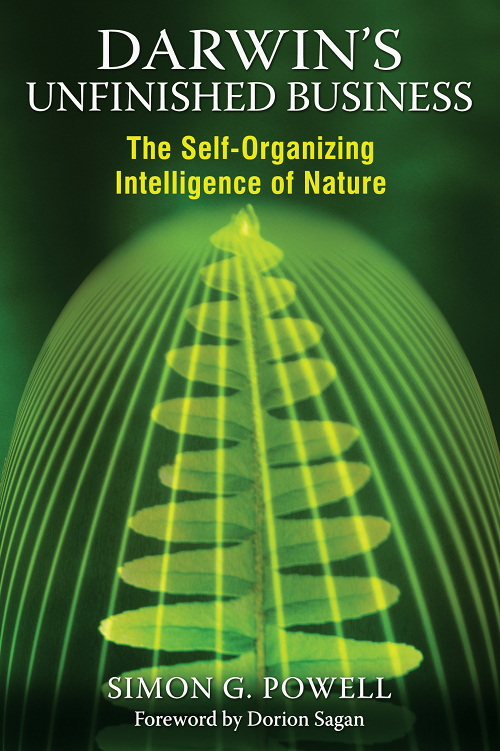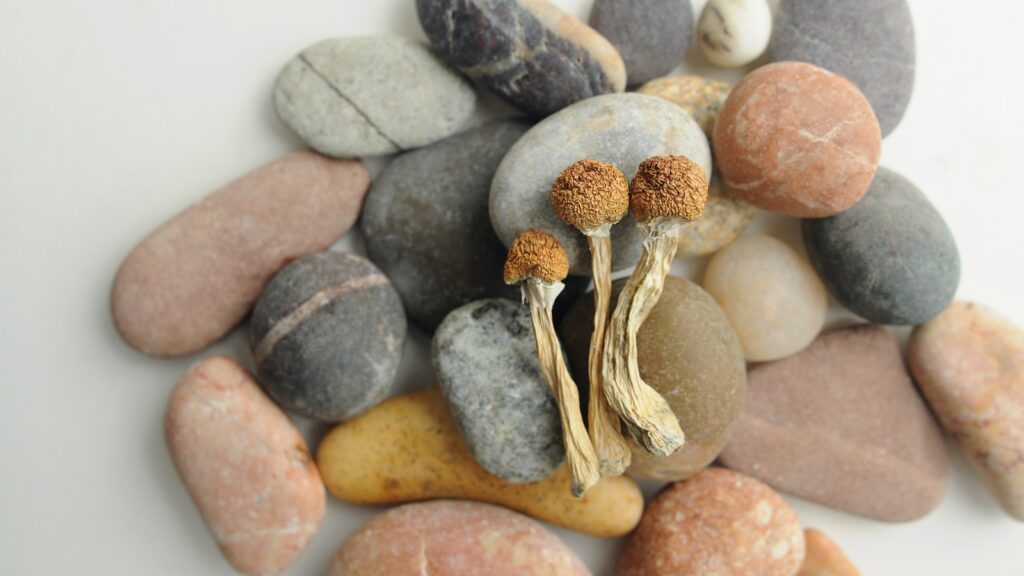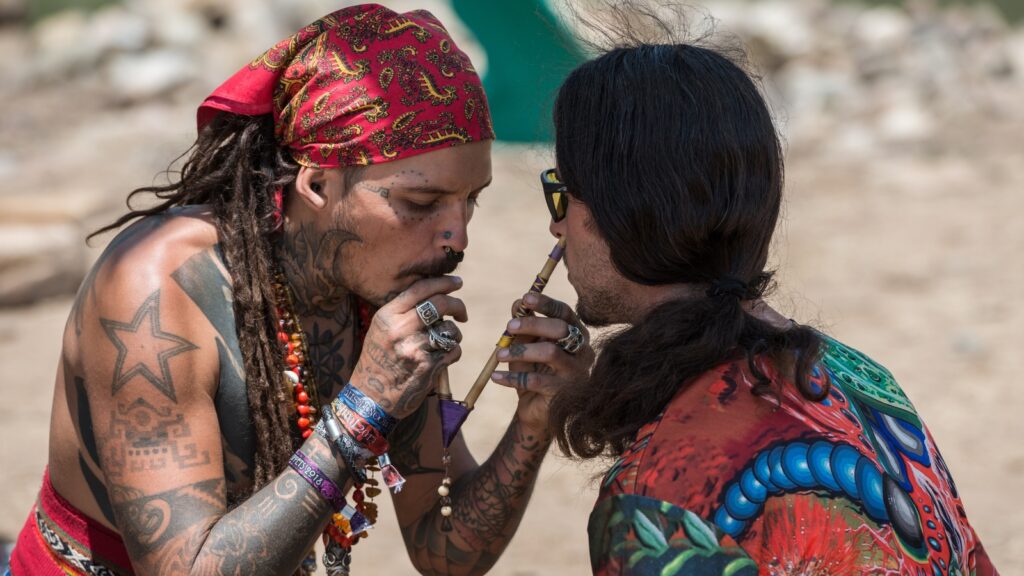The following is excerpted from Darwin’s Unfinished Business: The Self-Organizing Intelligence of Nature by Simon G. Powell, published by Park Street Press.
Simon Powell will be joining host Dennis McKenna for the live, interactive video course, “What Plants Can Teach You: Consciousness and Intelligence in Nature.” A new paradigm is emerging that recasts how we relate to and understand nature, supported by new scientific evidence. Plants instruct us through their behavior, through their interdependence with the environment, and through direct transmissions conveyed by spirit. Along with Tony and Dennis, the course gathers some of the leading experts in the emerging field of plant intelligence, including: Chris Kilham, Tony Wright, Dayna Baumeister, and Stephen Harrod Buhner. This 5-part Evolver webinar starts this Tuesday, June 17. Click here to learn more.
Over a hundred and seventy years ago an observant young man named Charles Darwin began to formulate a scientific theory that would dramatically change our view of life on Earth. Darwin’s bold assertion that life has evolved over time through a gradual process of natural selection proved to be so controversial that its veracity is even now being fought over tooth and nail. Darwin verily rocked the world, and things have yet to settle down. Evolution is an issue that has had everyone from the Pope to Supreme Court judges earnestly debating its merits as a principle that can account for the existence of complex life. Despite the accumulation of evidence in favor of biological evolution (i.e., the existence of mutable DNA within all organisms, common anatomy, vestigial organs, the fossil record, etc.), people remain divided. Science avidly champions evolutionary theory, whilst many religious people avidly rally against it. Indeed, in the USA apparently half the population refuses to believe that the human race arose through an evolutionary process.
In the wake of these disputes, the intelligent design movement has sprung up. Based in the USA, the movement claims that evolution through natural selection cannot, by itself, explain certain intricate features of organisms. The inference is that some sort of omnipotent supernatural influence (i.e., an influence issuing from “outside” of Nature) is able to manipulate life and guide evolution. Even though most scientists accuse the movement of peddling an untestable brand of badly concealed creationism, the readiness with which intelligent design arguments are bandied about highlights the suspicion in many people’s minds that conventional evolutionary theory is incomplete and “missing something.”
Let me lay my own cards on the table. I submit that we are justifiably right to bark at the current orthodox view of evolution. However, the proponents of intelligent design are barking up the wrong tree. The problem lies not with evolutionary theory per se, but rather the way in which evolution is perceived, appraised, and delineated. The official line is that evolution can be defined as a change in a gene pool over time, or, to be more specific, a change in gene frequencies over time. Short and masterfully blunt, this kind of definition is found in most biology textbooks—yet it simply does not cut it. Such a definition is not wrong, but neither is it right enough. In a way, it is like defining the development of a book as a change in a text pool over time, or a change in word frequencies over time. This is true of course, but it is not true enough.
Given that the evolution of life is one of the most impressive and astonishing processes we know of, to define evolution merely as a change in gene frequencies over time is a lame definition that deserves barking at. Likewise, if polar bears, lizards, dragonflies, and the metabolizing cells of which they are built are considered as nothing more than the outcome of certain combinations of genes, then it is no wonder that many people are suspicious of Darwin’s theory. Moreover, people are perfectly correct to infer some sort of intelligent design (albeit natural) throughout the tree of life. Not just in certain ultra-complex organs, but in any part of any organism. Even the most cursory glance at a biochemistry textbook highlights the mind-bogglingly impressive molecular machinery that, with precision and finesse, underlies all forms of life. Indeed, biological science is currently uncovering so many new and marvelous facts about genetic processes as to necessitate the creation of a whole new language. Exotic technical words are being invented daily in order to label the newly discovered molecular machines and molecular routines being observed within cells, biochemistry coming to sound more and more like the study of some highly advanced alien technology. How molecular biologists manage to keep a lid on all this is anyone’s guess. And yet unfathomable supernatural forces are not required to explain these remarkable facts of life. Nature, by way of evolution through natural selection, is the intelligent design force, or intelligent system, that weaves together intelligently functioning biological structures.
The idea that Nature’s evolutionary processes involve, and produce, intelligence may sound straightforward enough—yet it does not sit well with orthodox science or, oddly enough, with intelligent design enthusiasts. Intelligence is one of those words that we generally preserve for ourselves alone and not for something as seemingly abstract as the larger system of Nature. Hence, science flatly denies that biological evolution is intelligent, claiming instead in no uncertain terms that evolution (and, by implication, Nature) is blind, dumb, and utterly mindless. On the other hand, religious-minded scientists (like the proponents of intelligent design) insinuate that the intelligence involved with the existence of life lies mysteriously outside of Nature rather that seeing intelligence as being a fundamental property of Nature or a fundamental aspect of living things. In my book, Darwin’s Unfinished Business, I attempt to venture beyond both the orthodox scientific view of evolution as well as the intelligent design creationist view, to gain a fresh perspective on evolution that might warrant acceptance from everyone. No new processes are invoked in order to achieve this new perspective. No supernatural phenomena are summoned. It is rather the case that life and evolution are reinterpreted—in the same way that one might reinterpret the meaning of a book or an ancient hieroglyph.
As intimated, my chief contention is that evolution through natural selection is a process that displays the chief characteristics of intelligence. I also contend that the laws of Nature, which facilitate evolution, are likewise bound up with intelligence. I portray this new perspective in terms of natural intelligence (thus making it distinguishable from, say, artificial intelligence or human intelligence). I do not mean that Nature is conscious, or that evolution has foresight, or that natural intelligence is exactly like human intelligence. What I mean is that intelligence is essentially an information-gaining capacity in which learning takes place, problems are solved, and sense is made—and that this kind of clever sense-making capacity is not restricted to the brain/mind. Nor is it restricted to robots and other examples of artificial intelligence. On the contrary, Nature, the Universe, can be seen as one vast system of self-organizing intelligence, biological evolution being one particular way in which this intelligence gradually but inexorably expresses itself.
Taking intelligence in its normal usage, if you are intelligent you can learn about, and make sense of, the world around you (and, of course, make sense of an IQ test). The more sense you can make, the smarter you are likely to be. The more environmental information you can access, store, and organize, the more ingenious you can be in your behavior in that environment. Take a native tribe that has existed in the Amazon for millennia. Such a tribe evinces intelligence because they have made good sense of their jungle environment and can thereby live and survive there. They have learned how the jungle environment works and can use this knowledge to their advantage. Or take a prominent historical scientist like Michael Faraday, immersed as he was in the academic environment of physics studies and chemistry studies: Faraday was highly intelligent because he managed to make sense of electromagnetism and paved the way for our electricity-using culture. (Note here that in both examples sense is/was being made of something that was always “out there” and already sensible. The realization that Nature affords learning is something that I will go into much more in detail about later, as it bears heavily upon the process of sense-making.)
Now, the process of evolution likewise demonstrates the capacity to actively make sense. It achieves this through the vehicle of bio-logic (by “bio-logic” I mean the network of physiochemical processes found inside living things). Indeed, the kind of sensible biological engineering achieved by evolution ranks higher than any human technological achievement. Think of how difficult it is to build a biosphere populated by 100 million species—from scratch. Or how to overcome gravity and fly. Or how to photosynthesize (i.e., feed upon photons of light). Or how to build antifreeze agents. Or how to live in boiling sulfurous water. Through evolution, life has learned a plethora of ingenious sense-making techniques—such as specific protein sequencing, metabolism, motility, morphogenesis, cellular orchestration, aerobic and anaerobic respiration, self-repair, temperature regulation, replication, making use of electrochemical potentials, symbiosis, sight, hearing, the use of tensegrity (to achieve stable cell structure), and so on. These nifty techniques—all of which crucially allow living things to make sense of the world and thus be—are written down in enduring (but still mutable/flexible) DNA. Indeed, genomes represent vast libraries of learning, a form of digital text scripted, honed, and refined over millions of years. The human genome, for instance, contains information pertaining to the production and orchestration of 100 trillion cells into a tightly bound organism potentially capable of warding off death in excess of one hundred years. A single fertilized human egg cell can gracefully differentiate into lungs, liver, spleen, heart, muscle, tendons, sinew, stomach, urinary tract, brain, nervous system, blood, bone, eyes, ears, tear ducts, skin, and so on—all knitted together into one cohesive self-organized whole.
Such ingenious biological behavior clearly evinces intelligence of some kind, as does the evolutionary process, which wrote the human genome and scripted the behavior, and as do the laws of Nature that foster all this creative activity. Not necessarily conscious intelligence—Nature does not need to consciously “know” what it is doing through natural selection, nor do cells need to consciously “know” what they are doing (although awareness or sensation of some kind is not ruled out). It is rather the case that bio-logic behaves in a remarkably smart and sensible manner, as does the process of evolution which continually edits and refines bio-logic.
Evolution through natural selection is therefore much more than simply a change in gene frequencies over time. Evolution involves a cumulative series of sensible genetic changes. Sensible changes to genetic information equate to sensible biological outcomes. And sensible biological outcomes are, of course, those that ensure survival. In other words, changes in bio-logic that make some kind of good life-affirming sense in the light of Nature, or in the light of the environment, are the ones selectively favored by Nature. So when Darwin himself defined evolution as descent with modification, it is more accurate and more informative to speak of descent by way of sensible modifications to genetic information. Ipso facto, this gives evolution an inherent direction. Because there are specific ways in which to make sense (due to things like the specific laws of Nature and the specific manner in which atoms, molecules, and energy behave), this channels evolution into specific sense-making pathways. So where natural selection favors, say, a specific chemical cycle that yields useful energy, this means that bio-logic must perforce be attuned to the equally specific chemical and molecular laws that govern energetic chemical reactions. Indeed, it is precisely this inherent tendency for natural selection to engineer specific solutions to the art of living that explains the phenomenon of convergent evolution where we see the same sensible organ or the same pattern of sensible biological behavior evolving in multiple branches of the tree of life. Thus, the irrepressible pop cultural meme “the survival of the fittest” faces immanent extinction, and a new and much more apt meme can take its place—namely the survival of that which makes sense. It is this sensible aspect of genetic change, the fact that Nature repeatedly favors the survival of genetic information that elicits sensible biological behavior that characterizes the intelligence intrinsic to the process of evolution.
With current thinking, however, we generally only associate intelligence with human behavior and find it difficult to ascribe intelligence to physical, chemical, or biological processes. This is most likely due to the fact that our language is highly anthropocentric. No surprise then that the term “biotechnology” refers to our manipulations of bio-logic and not to bio-logic itself. So whereas we will ascribe intelligence to, and be impressed by, genetic engineering procedures that can make cows secrete insulin in their milk, we will not generally view mammalian lactation itself as being an impressively intelligent biological process.
Even if we do concede intelligence outside of our species, it is usually only because of some sort of relatively simple tool use displayed by another creature. Since a tool is an object designed to perform a specific useful function, we readily associate tools with intelligence. Thus, we might conclude that chimpanzees are intelligent to some degree if they can break open a nut by pounding on it with a carefully chosen stone. Or if a chimpanzee utilizes a carefully chosen twig with which to fish for termites then we likewise infer that some degree of intelligence is being exhibited. But what of the chimpanzee’s hands? Are they not tools for grasping objects? And what of its hand/eye coordination? Are the brain and nervous system of the chimpanzee not tools for making sense of the world around it? And what of its breathing as it carries out its nut- pounding endeavors? Are lungs not tools for imbibing oxygen? And are the molecules of hemoglobin in blood not tools for grasping individual molecules of oxygen so as to transport them around the body? Indeed, isn’t the circulatory system an organismic tool for transporting nutrients, gases, and wastes? To be sure, if you were to carefully examine each and every part of the chimpanzee’s body (or any organism), you would find system upon system of functional organelles, tissues, and organs—all of which are way more impressive than nut-cracking with a stone. The overt use of external tools rests upon, and is dependent upon, a huge hierarchical pyramid of internal biological tools. In other words, a genome is a code utilized to make vast arrays of sensible biological tools, which are woven together into a single cohesive multi-functional totality. This totality—the organism—can then make tools outside of itself.
The life-enhancing biological tools that genomes code for have been designed by Nature through the process of evolution through natural selection—not necessarily consciously designed as we might consciously design something—but designed in the sense of having been shaped and honed to a high degree of specificity via the action of natural selection over millions of generations. Even the process of evolution itself can, if viewed over a long period of time, be seen as a tool for making tools. Once you begin to expand your concept of what a tool is, it becomes apparent that intelligence goes deeper than relatively simple overt behavior involving external tools (which we happen to be good at). Given that everything behaves in a certain way (this includes bio-logic and all and any other part of Nature), then intelligent behavior can be extended beyond human behavior alone. A process/behavior of any kind that gains information, learns, and actively makes sense of some larger context is, I submit, an intelligent process/behavior—or at the very least such a process embodies the essential principles of intelligence to some degree.
My point then, is that intelligence manifests as a particular kind of process not restricted to human behavior and that if we are to debate the process of evolution with any kind of justice, then we must perforce admit that evolution operates intelligently in terms of the sensible patterns of behavior that it engineers via bio-logic. After all, it was evolution that crafted the human brain. To state that we are intelligent, but that the process that sculpted our brains was not, seems a tad suspect. As does the notion that we are intelligent but the neuronal systems underlying our minds are not. Human intelligence must, in some essential way, rely upon the brain, and the specific way in which the brain organizes information. These brain mechanisms are assuredly behaving and functioning in a clever manner (so clever in fact that science has a hard time understanding the full workings of a single neuron let alone the workings of the entire brain). Similarly, if we imagine (courtesy of our clever brains) the long evolutionary line of ancestral hominid brains that led up to the modern human brain, it is clear that a progressive and ingenious engineering process is at work. Granted, this might have taken millions of years and involved much pruning at the hands of natural selection, yet the efficacy and sheer architectural prowess of Nature are, in this instance, undeniable. In my mind at least, the inference of natural intelligence within Nature is the only reasonable way of appraising both the evolutionary process and the complex organisms wrought by evolution. All the established facts about life do not change, only the interpretation of those facts. Hence, I propose that the concept, or paradigm, of natural intelligence be brought to the debating table and be given serious consideration by anyone interested in the meaning and significance of life.
All of which I speak is of the utmost importance. Indeed, paradigms concerning evolution and our place within Nature rank extremely high in the collective psyche. This explains why there is so much friction and discord between religion and science, and why there is a veritable industry of heated debate. Each group becomes more and more vociferous as the debate intensifies and the stakes escalate. A resolution must be forthcoming—for the simple reason that an objective truth exists. As I have said, I am convinced that the root of the discord lies with the way in which we conceive of evolution. We look at details and tend to lose sight of the bigger picture. Only when we look at the bigger picture and see Nature as a single coherent sensibly behaving system can we properly divine natural intelligence. If we spend too much time analyzing details we will miss the larger context of which those details are a part. This is especially the case when the issue of genetic change is explored. By acknowledging that natural selection involves the preservation of sensible modifications to the genetic text and not just any old modifications, one is forced to consider the larger environment that provides something to make sense of. Because Nature is sensible a priori (“a priori” means “given before the fact”) due to natural laws and the various effects of those laws, sense can be made of Nature by way of evolving bio-logic. This realization suggests that Nature is to be understood first and foremost as a system of self-organizing intelligence in which life, consciousness, and information are all falling into place.
Having said as much, it is clear that the paradigms currently steering human culture, particularly in the West, bear no reference whatsoever to natural intelligence. This might well explain why so many environmental and existential crises face us. Conventional science resolutely denies that any intelligence is involved in evolution, let alone other natural processes, and so it is principally human intelligence and all the inventions and ideas of human intelligence, which are esteemed, and which come to determine the progress of human culture. In this sense we are going it alone, a species intent on divorcing itself from the natural intelligence that birthed us. It might well be that until we acknowledge the role of natural intelligence in the evolution of the tree of life then we shall remain estranged from the rest of Nature and continue to suffer the consequences. In all fields, right relationships bring health and balance. To acknowledge the presence of natural intelligence within Nature, to seek to learn from that intelligence, is to begin placing oneself in a right relationship to all else.










